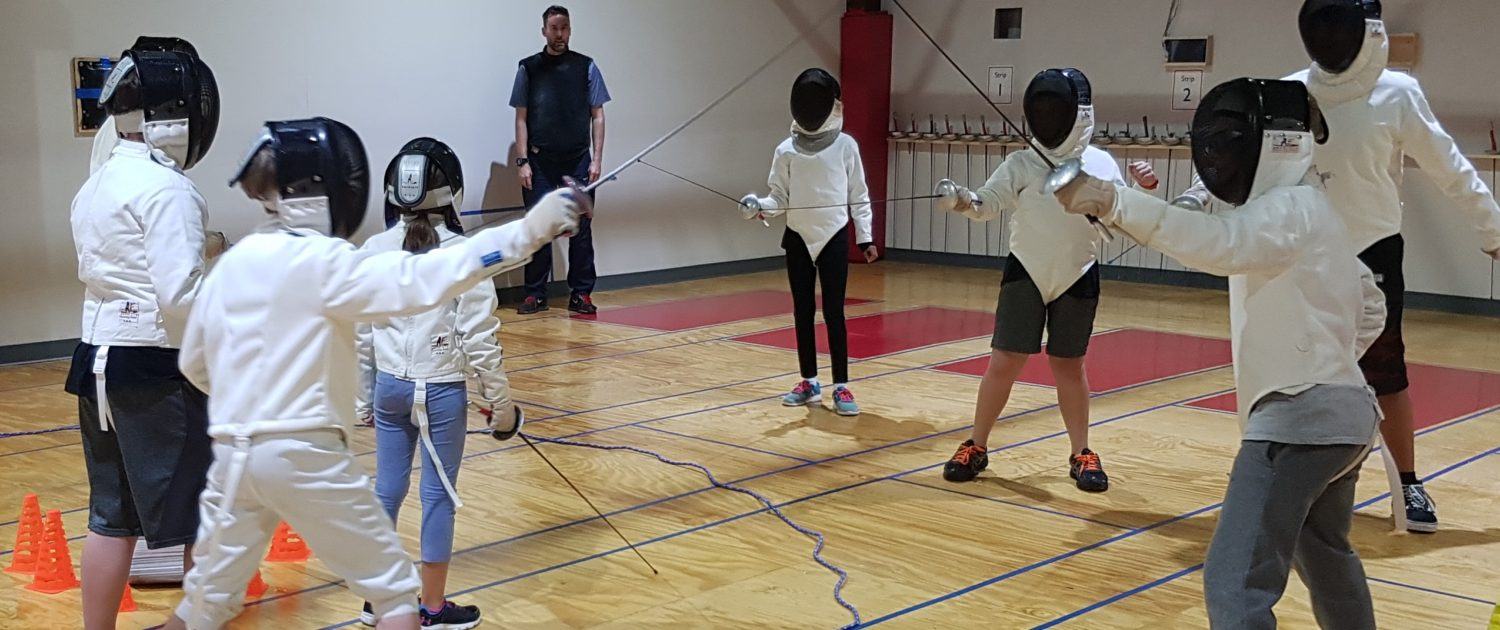At what age can my child start fencing, and which weapon should we pick?
Youth epee fencers training at Houston Swords Sports
what's a good age to get started in fencing?
While there are no hard and fast rules to what age your child should start fencing, most fencers start around age 9. Most fencing clubs will not accept children under age 7 as the balance and hand-eye co-ordination needed to fence are not sufficiently well developed before age 7.
Older beginners, that is, children who are 12 or 13 when they start, need a great deal more commitment to catch up if they intend to become competitive fencers seeking national points. If not, they can segue to recreational fencing easily, enjoying the sport and competing at a level they feel comfortable at.
My son came to fencing after trying soccer, basketball, baseball, tennis, swimming, and gymnastics. He started out with the foil at age 9 because the fencing club closest to our home was a foil club. Even as we learned more about epee and saber, my son decided to stick with the foil.
Which weapon should my child start with? Foil, epee or sabre?
Last weekend, at one of the numerous local tournaments that my son attends for practice, the conversation between the fencing moms in attendance turned to how our kids picked the weapons they now fence with. The answers ran the gamut. Some had simply gone to the closest fencing club, and signed their kids up for the weapon that that particular club specialized in. That's certainly the case with my son with the foil. Others had picked the weapon because a parent, relative or friend had experience with the weapon and so they decided to go with it. Others had switched away from the original weapon they started with for a variety of reasons. Nearly all moms wished they had been better informed at the start.
There is plenty of "wisdom" circulating about the characteristics required of a fencer to succeed in a particular weapon. I would advise you to be careful with such "wisdom". I've heard that height is an advantage in epee and foil, or that strength and an aggressive nature is an advantage in saber...and on and on. Yet, we see highly successful epee and foil fencers who are medium height at best, and successful saber fencers who are not powerfully built.
Every weapon accomodates a range of fencing styles, and a fencer can succeed regardless of what their physical attributes are. As in any individual sport, the mental aspects of fencing play a huge role in a fencer's ultimate success. So, when your child 1st starts out, don't worry too much about whether your child is tall, short, fast, or strong. Don't attempt to pick the right weapon based on those attributes.
Make the decision to stay with the original weapon or switch depending on what your child enjoys best. The 3 weapons are different but equal.
Traditionalists believe that the foil provides the best fundamental fencing background for a fencer, primarily because foil incorporates the features of the other 2 weapons. Young fencers learn "right of way" rules in foil, which are also applicable to saber. There are no "right of way" rules in epee, and some fencers who start out with epee have trouble figuring out the "right of way rules" in foil and saber. Similarly, fencers who start with foil, and struggle with right of way rules, succeed when they switch to epee.
With very few exceptions, competitive fencers serious about earning national points will pick a weapon to focus on by the time they reach the Y14 age group. The commitment of time to a rigorous training and tournament schedule (while juggling schoolwork) makes it difficult to train and compete seriously for a second weapon. The differences in footwork, target areas and "right of way" rules make it quite challenging to achieve competitive excellence in more than one weapon.
For fencers who love the sport, but are not focused on national points, then fencing more than one weapon recreationally is a very enjoyable experience.
One of the best ways for parents to learn more about a weapon is to attend a referee clinic. You will learn an enormous amount not only about the rules but also about the challenges related to the weapon from an expert. You will equip yourself with valuable knowledge and information which you can draw on to support your fencer. If your fencer is old enough, your fencer should also attend the referee clinic.
Useful Links
Epee? Foil? Saber? What’s The Difference, And Why U.S. Fencing Stars Picked Theirs
What the heck is a saber, foil and epee? Olympic fencing explained.
Watch this excellent video on the basics of foil fencing.
Share this post with someone who will find it useful



